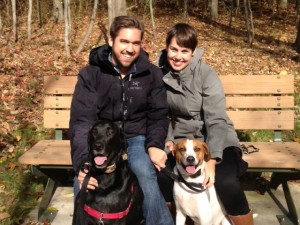 December
16
December
16
Tags
INFERTILITY SURVIVAL GUIDE: PART 6 – Maria of Grand Rapids
Excerpt From “My Little Baby: Stories of an Infertile Woman” By Maria Novotny
I remember the day that I found out about Amanda. It was the first week of August. I was sitting in the Writing Center during a free session. On my email, a chat box popped up. Recently I had just revised my Gmail settings in order to be visible to more people at the Center. The message was from my cousin Sarah. Surprised, thinking a family member had passed away, I kept reading the message….
1:08 PM sarah.houtler: hey Maria! I don’t know if the news was passed along, but Amanda is pregnant
7 minutes
1:16 PM me: Thanks. I did not hear But that is exciting. Tell her congratulations
sarah.houtler: I will. I am going back to Milwaukee this weekend she just let the fam know
1:17 PM I guess she is about 3 months along
1:18 PM me: exciting
The seven minute pause captures my devastation. In those relatively short seven minutes I experienced anger, sadness, panic and frustration. I thought about us. I thought about Amanda and Adam. I thought about my aunt and uncle who would now be grandparents. I thought about my own parents and grandparents. Did they know this news? Did they purposely not tell me this news? Quickly I returned to anger. Why did Sarah have to tell me like this? Over fucking g-chat?!!? What the hell was I to say?
______________________________
 Google alerts landed an infertility tagged article in my mailbox, Our Infertility Story: Struggling to find support in the #1 city to raise a family. The face of a young radiant woman smiled from the photo. When I was done reading the article, I was compelled to speak with her directly. Maria is now 27 years old. Most people who dealt with infertility and are compelled to action are in their late forties to early fifties. Maria is the youngest person I know to combat infertility, come to terms with it and start building a local support community in a place that is a reactionary minefield.
Google alerts landed an infertility tagged article in my mailbox, Our Infertility Story: Struggling to find support in the #1 city to raise a family. The face of a young radiant woman smiled from the photo. When I was done reading the article, I was compelled to speak with her directly. Maria is now 27 years old. Most people who dealt with infertility and are compelled to action are in their late forties to early fifties. Maria is the youngest person I know to combat infertility, come to terms with it and start building a local support community in a place that is a reactionary minefield.
Maria: My husband graduated with a Masters in Mechanical Engineering and we moved to Grand Rapids for his job. We didn’t know anything about Grand Rapids at all, we knew we were going to be here for a while for a job and we decided to buy a house, settle in and take root in this community. But it’s a very different type of community. It’s Calvinist, so there’s Calvin Conservative College that’s here … so the first question that we were asked when we moved in was, “What type of religion are you?” which really kind of shocked us. I never expected to hear this right away from our neighbors. We’re Catholic, but we don’t always practice.
My husband and I are both from the Midwest. I’m the oldest of six children and my husband is the oldest of four. So when we got married we always knew we wanted to have kids, relatively young, relatively right away. We kept trying and trying, going to the doctors, fertility clinics and everything was said to be fine, nothing seemed out of the ordinary. We were told you’re young, it will happen eventually. After three years of trying really hard we said, “We’re diagnosed infertile, we don’t really know what’s wrong”. It’s a very emotional thing you go through so we were pretty much all alone here. Kevin had his work, and our neighbors… one of them is 23 and she’s having her 4th child, she got married and wanted to have kids. Our other neighbors are 26 and they have three children and another one on the way. So a lot of them just stay home and … It was just isolating a little bit.
I reached out to a local Methodist church and asked if there was a group for men and women to meet and talk, and I was told that sometimes men attended, but mainly the group was for women who wanted to talk about things because it’s a woman’s issue. The fertility center allowed [support group] participation only for patients actively seeking IVF treatment. I found it to be really offensive because it’s only for people who want to attempt to have a child as well as go through those practices.
THE CYCLE RELAY: Doesn’t it make you crazy that it’s only people going through IVF that are officially considered worthy of emotional support for infertility?
Maria: It was so offensive. My husband and I went to the informational session. It felt more like a sales pitch or something. I felt uncomfortable how they were talking about bodies, babies, and how paying so much will actually … it really made me question some of the things they were talking about. It just pissed me off, to be honest. We did consider freezing eggs, but I think because we’re are still young, this idea freaks me out. I kind of reject that I have to invest so much time and figure out the timing of everything. I don’t believe life operates that way.
Eventually I’ve decided that I’m not getting pregnant, so I’m going back to grad school. I do lead a dual life, because I do spend a lot of my time at Michigan State, a community that’s much more accepting, much more open, much more liberal, where I can talk about some of this. So I was thinking a lot about how to write about that, how to talk about how when you’re infertile, you don’t necessarily fit the ideal.
I reached the point when I could no longer complain about how I felt living in Grand Rapids. I was just sick and tired, and so I decided to join a support group so I could at least find a community. I was really upset to find out that there were very limited opportunities. I’ve learned that it East Michigan there are four resolve groups that actively meet once a month. But in west Michigan there was absolutely zero.
This city is number one per-capita for churches. But I wanted something non-denominational where men and women could attend, as well as gay or straight people. There’s a rated vision in Grand Rapids about homosexual activities, it’s pretty divided. I don’t believe I’m the only one who feels this way. I do believe there’s a lot of money and power with the conservative group and with a lot of Calvinists here. Because of that they drive a lot of what gets valued what gets seen. There’s a lot of other types of life happening here but it’s just not seen or heard in ways that really reach out to a lot of people.
So I turned to Resolve, because it was the only way I could get information about support on what it means to be infertile or at least understand how other people were feeling. I would go on their blogs pretty frequently just to feel like I was not the only one. At Michigan state, the type of program I’m taking is really about community involvement and community engagement and work on practices of the community. And as I was studying I really had no intention of bringing in my own infertility or my own personal issues…But someone had to step in and start a conversation.
THE CYCLE RELAY: So from what you’re saying, there’s a particular type of life that you’re expected to lead in Grand Rapids, and certainly you’re not fitting in. Are you worried about that?
Maria: I think I was a little. I still feel a little isolated living here. I feel like I don’t fit in with the types of people, but I must say I still try to understand geographic divide, and so from there I get a lot of my strength, a lot of my community. And I think it really drives me to try and make a better space here in Grand Rapids. I wrote the article to contact other people who are experiencing infertility here. I never tried to be offensive. I made the decision to include the names of these places so if there’s other people looking for support they will know about these places and their feedback. I knew someone would read it and might get offended, but at the same time if someone was looking for information it should be drawn attention to. So…
THE CYCLE RELAY: I really applaud you for putting together a group and being able to translate what you have inside into a form of action that will benefit other people. I think it’s so important, not just for others who are challenged by their infertility and their silence, but also will be a tremendous value for you too. Especially in the community that’s so different.
Maria: Can I ask you a question?
THE CYCLE RELAY: Sure.
Maria: What was the Forum about and is it an annual conference?
THE CYCLE RELAY: I tried to put together a group of brilliant, creative, intelligent people who each struggled with their infertility on their own. Then I combined the experiences so that our collective voices could create a stronger impression of those multiple paths that lead out of the dungeon back into the light. The people who came were mostly patients coming to the realization that treatment was not going to work for them, and they were faced with all of these big choices. The most painful part of the entire process is the realization that the hope you were cherishing is disappearing.
Either you’re going to go for another round or you’re actually going to face your own humanity and understand that as human beings we’re not created perfect. We’re mortal, we need to contend with issues of existence, life sometimes is not fare, and whatever cards we were dealt, the bottom line is to find meaning of your path, even if it’s not with children. Motherhood is such a wonderful capacity because it allows somebody to love unconditionally, beginning on the basic level of survival. There’s nothing else like that in the world, but if that’s not given to you, there are other ways; it’s called the principle of Generativity. It’s a really interesting psychological principle, that is based on the concept of shifting your focus from yourself to another individual, and this principle of Generativity could be localized within the family, or if you do not have a family it could be localized within the community, essentially exactly what you’re doing, what I’m doing. Growing in a different way.
Maria: So this is what the documentary is about a little bit?
THE CYCLE RELAY: A little bit.
Maria: That’s great.